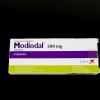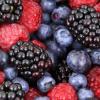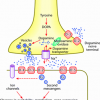http://www.businessinsider.com/13-scientific-reasons-to-drink-coffee-2013-11

Interesting Article : 13 Scientific Reasons To Drink Coffee
#1
Posted 25 November 2013 - 05:49 PM
#2
Posted 07 December 2013 - 02:19 PM
#3
Posted 07 December 2013 - 03:08 PM
Why? Is there any interaction between both?Careful, the addition of sugar or milk can negate all of the benefits. However, a little splenda and soy milk; and, your golden.
I wonder if one should drink coffee everyday or alternate with days off to avoid tolerance?
#4
Posted 08 December 2013 - 04:18 AM
Careful, the addition of sugar or milk can negate all of the benefits.
There is some evidence that adding milk reduces bioavailability of polyphenols from green and black teas; adding milk to coffee might be OK, though:
http://www.nutraingr...lk-Nestle-study
Antioxidant uptake from coffee unaffected by milk: Nestlé study
By Stephen Daniells , 26-Jan-2010
Adding milk to coffee does not reduce the bioavailability of antioxidants, says a new study from the Nestlé Research Center.
Drinking instant coffee with or without milk produced the same uptake levels of coffee’s antioxidants, including caffeic acid, ferulic acid, and isoferulic acid, according to findings of a study with nine people published in The Journal of Nutrition.
Non-dairy creamer/ sugar was found to impair absorption of coffee antioxidants.
Edited by blood, 08 December 2013 - 04:53 AM.
#5
Posted 08 December 2013 - 09:20 AM
Lorenz, Mario, Karl Stangl, and Verena Stangl. "Vascular effects of tea are suppressed by soy milk." Atherosclerosis 206.1 (2009): 31-32.
With respect to coffee, I haven't decided whether paper filtered drip brew or espresso is healthier. Cafestol and kahweol are both fairly potent Nrf2 inducers (with the usual chemopreventative effects), and are largely lost as coffee is filtered through paper. For most, however, that may be a positive as these also increase LDL and total cholesterol by interfering with bile acid synthesis.
#6
Posted 08 December 2013 - 10:04 AM
Soy milk also interferes with polyphenol absorption from tea.
Lorenz, Mario, Karl Stangl, and Verena Stangl. "Vascular effects of tea are suppressed by soy milk." Atherosclerosis 206.1 (2009): 31-32.
Good to know - thanks for posting that. Never occurred to me that soy milk could be a problem.
With respect to coffee, I haven't decided whether paper filtered drip brew or espresso is healthier. Cafestol and kahweol are both fairly potent Nrf2 inducers (with the usual chemopreventative effects), and are largely lost as coffee is filtered through paper. For most, however, that may be a positive as these also increase LDL and total cholesterol by interfering with bile acid synthesis.
Do you take your coffee black?
#7
Posted 08 December 2013 - 01:42 PM
#8
Posted 08 December 2013 - 02:25 PM
Careful, the addition of sugar or milk can negate all of the benefits. However, a little splenda and soy milk; and, your golden.
I can't think of any biochemical reason why sugar would negate all of the benefits, at least if it's in small quantities. Be that as it may, I try to avoid sugar when I can, so I use splenda in coffee. Also half and half.
#9
Posted 14 December 2013 - 04:32 AM
However, this paper strongly suggests that the darkest roasts are best:
Paur, Ingvild, Trude R. Balstad, and Rune Blomhoff. "Degree of roasting is the main determinant of the effects of coffee on NF-κB and EpRE." Free Radical Biology and Medicine 48.9 (2010): 1218-1227.
Coffee, one of the most popular beverages worldwide, is a major contributor of phytochemicals in the diet and contributes more than 50% of dietary antioxidants in many countries. A moderate intake of coffee has been linked to reduced risk of chronic diseases. Furthermore, experimental studies demonstrate bioactivity of coffee or coffee compounds in inflammation and oxidative stress, two major, related biological processes. We show that the degree of roasting correlates with the efficiency of dampening inflammation-induced NF-κB activity and inducing antioxidant defense through Nrf2/EpRE activity. Extracts of dark-roasted coffee inhibit NF-κB activity by more than 80% and induce EpRE activity more than 25-fold in vitro. In transgenic NF-κB-luciferase mice, a single dose of dark-roasted coffee extract per os inhibits NF-κB activation by 63% in the whole mouse, with the liver being the main target, with a 68% reduction in activity. In transgenic EpRE-luciferase mice, the extract of coffee increased overall EpRE activity by 30%, again with the liver as the main contributor, with a 2.7-fold increase. Our results demonstrate that dark-roasted coffee dampens a crucial mechanism in inflammation and induces a pivotal mechanism in oxidative stress defense.
I would readily give up inconsequential ORAC values for more Nrf2 induction and NF-κB inhibition. It seems tonight will be spent researching roasted coffee melanoidins.
There's a parallel to tea, where some purpurogallins from oxidized black tea are more potent in modulating these two pathways than their parent catechin compounds from green tea.
Edited by Darryl, 14 December 2013 - 04:41 AM.
Also tagged with one or more of these keywords: coffe, smart, drink, supplements
Science & Health →
Brain Health →
Mental Health →
ADHD SOLUTIONSStarted by Young Paul , 23 Feb 2025 |
|

|
||
Science & Health →
Supplements →
Supplement/Prescription drug Interaction website?Started by FHC_guy , 19 Feb 2025 |
|

|
||
Science & Health →
Supplements →
Mental clarity and dopamine managementStarted by JMorgan , 15 Feb 2025 |
|

|
||
Round Table Discussion →
Business →
Retailer/Product Discussion →
Create your own SupplementsStarted by Emanresu , 10 Feb 2025 |
|

|
||
Science & Health →
Medicine & Diseases →
Best health investments - 3KStarted by Bania , 17 Jan 2025 |
|

|
1 user(s) are reading this topic
0 members, 1 guests, 0 anonymous users















































